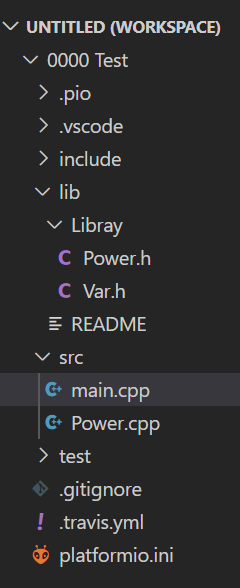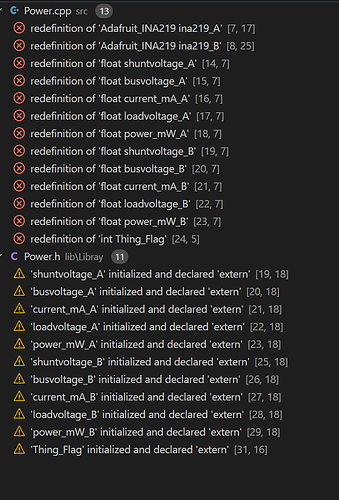Very sorry if this is the wrong group or posted incorrectly first post on this community.
There is so many discussions about this subject I have become totally confused.
I have taken this from a much larger programme and stripped it down to its bare elements, that still exhibits the same problem I’m experiencing. First is a quick picture showing the programme structure
Main.cpp
#include <Arduino.h>
#include <TaskScheduler.h>
#include <Wire.h>
#include <SPI.h>
#include "Power.h"
void setup() {
currentoldA=0;
currentoldB=0;
voltageold=0;
}
void loop() {
Power();
delay(2000);
}
Power.cpp
#include <Arduino.h>
#include "Power.h"
void Power(){
shuntvoltage_A = 0;
busvoltage_A = 0;
current_mA_A = 0;
loadvoltage_A = 0;
power_mW_A = 0;
shuntvoltage_B = 0;
busvoltage_B = 0;
current_mA_B = 0;
loadvoltage_B = 0;
power_mW_B = 0;
for(int i=0;i<=9;i++){
shuntvoltage_A = shuntvoltage_A + ina219_A.getShuntVoltage_mV();
busvoltage_A = busvoltage_A + ina219_A.getBusVoltage_V();
current_mA_A = current_mA_A + ina219_A.getCurrent_mA();
power_mW_A = power_mW_A + ina219_A.getPower_mW();
loadvoltage_A = busvoltage_A + (shuntvoltage_A / 1000);
}
for(int i=0;i<=9;i++){
shuntvoltage_B = shuntvoltage_B + ina219_B.getShuntVoltage_mV();
busvoltage_B = busvoltage_B + ina219_B.getBusVoltage_V();
current_mA_B = current_mA_B + ina219_B.getCurrent_mA();
power_mW_B = power_mW_B + ina219_B.getPower_mW();
loadvoltage_B = busvoltage_B + (shuntvoltage_B / 1000);
}
shuntvoltage_A = shuntvoltage_A /10;
busvoltage_A = busvoltage_A /10;
current_mA_A = current_mA_A /10;
power_mW_A = power_mW_A /10;
loadvoltage_A = loadvoltage_A /10;
shuntvoltage_B = shuntvoltage_B /10;
busvoltage_B = busvoltage_B /10;
current_mA_B = current_mA_B /10;
power_mW_B = power_mW_B /10;
loadvoltage_B = loadvoltage_B /10;
currentoldA=currentoldA+current_mA_A;
currentoldB=currentoldB+current_mA_B;
voltageold=voltageold+busvoltage_A;
if(Thing_Flag>=60){
currentoldA=currentoldA/60;
currentoldB=currentoldB/60;
voltageold=voltageold/60;
//thingspeak1();
Thing_Flag=0;
}
Thing_Flag++;
Serial.print("Bus Voltage_A: "); Serial.print(busvoltage_A); Serial.println(" V");
Serial.print("Shunt Voltage_A: "); Serial.print(shuntvoltage_A); Serial.println(" mV");
Serial.print("Load Voltage_A: "); Serial.print(loadvoltage_A); Serial.println(" V");
Serial.print("Current_A: "); Serial.print(current_mA_A); Serial.println(" mA");
Serial.print("Power_A: "); Serial.print(power_mW_A); Serial.println(" mW");
Serial.println("");
Serial.print("Bus Voltage_B: "); Serial.print(busvoltage_B); Serial.println(" V");
Serial.print("Shunt Voltage_B: "); Serial.print(shuntvoltage_B); Serial.println(" mV");
Serial.print("Load Voltage_B: "); Serial.print(loadvoltage_B); Serial.println(" V");
Serial.print("Current_B: "); Serial.print(current_mA_B); Serial.println(" mA");
Serial.print("Power_B: "); Serial.print(power_mW_B); Serial.println(" mW");
Serial.println("");
}
Power.h
#ifndef POWER_H
#define POWER_H
#include <Arduino.h>
#include <Adafruit_INA219.h>
Adafruit_INA219 ina219_A;
Adafruit_INA219 ina219_B(0x41);
void Power();
extern float currentoldA;
extern float currentoldB;
extern float voltageold;
float shuntvoltage_A = 0;
float busvoltage_A = 0;
float current_mA_A = 0;
float loadvoltage_A = 0;
float power_mW_A = 0;
float shuntvoltage_B = 0;
float busvoltage_B = 0;
float current_mA_B = 0;
float loadvoltage_B = 0;
float power_mW_B = 0;
int Thing_Flag=0;
#endif
And this is the error I keep receiving
Verbose mode can be enabled via `-v, --verbose` option
CONFIGURATION: https://docs.platformio.org/page/boards/espressif32/esp32dev.html
PLATFORM: Espressif 32 1.12.2 > Espressif ESP32 Dev Module
HARDWARE: ESP32 240MHz, 320KB RAM, 4MB Flash
DEBUG: Current (esp-prog) External (esp-prog, iot-bus-jtag, jlink, minimodule, olimex-arm-usb-ocd, olimex-arm-usb-ocd-h, olimex-arm-usb-tiny-h, olimex-jtag-tiny, tumpa)
PACKAGES:
- framework-arduinoespressif32 3.10004.200129 (1.0.4)
- tool-esptoolpy 1.20600.0 (2.6.0)
- tool-openocd-esp32 1.1000.20190708 (10.0)
- toolchain-xtensa32 2.50200.80 (5.2.0)
LDF: Library Dependency Finder -> http://bit.ly/configure-pio-ldf
LDF Modes: Finder ~ chain, Compatibility ~ soft
Found 34 compatible libraries
Scanning dependencies...
Dependency Graph
|-- <Adafruit INA219> 1.0.9
| |-- <Adafruit NeoPixel> 1.4.0
| |-- <Adafruit GFX Library> 1.8.3
| | |-- <Adafruit BusIO> 1.3.0
| | | |-- <SPI> 1.0
| | | |-- <Wire> 1.0.1
| | |-- <SPI> 1.0
| | |-- <Wire> 1.0.1
| |-- <Adafruit SSD1306> 2.2.1
| | |-- <Adafruit GFX Library> 1.8.3
| | | |-- <Adafruit BusIO> 1.3.0
| | | | |-- <SPI> 1.0
| | | | |-- <Wire> 1.0.1
| | | |-- <SPI> 1.0
| | | |-- <Wire> 1.0.1
| | |-- <SPI> 1.0
| | |-- <Wire> 1.0.1
| |-- <Adafruit BusIO> 1.3.0
| | |-- <SPI> 1.0
| | |-- <Wire> 1.0.1
| |-- <Wire> 1.0.1
|-- <TaskScheduler> 3.1.6
|-- <Libray>
| |-- <Adafruit INA219> 1.0.9
| | |-- <Adafruit NeoPixel> 1.4.0
| | |-- <Adafruit GFX Library> 1.8.3
| | | |-- <Adafruit BusIO> 1.3.0
| | | | |-- <SPI> 1.0
| | | | |-- <Wire> 1.0.1
| | | |-- <SPI> 1.0
| | | |-- <Wire> 1.0.1
| | |-- <Adafruit SSD1306> 2.2.1
| | | |-- <Adafruit GFX Library> 1.8.3
| | | | |-- <Adafruit BusIO> 1.3.0
| | | | | |-- <SPI> 1.0
| | | | | |-- <Wire> 1.0.1
| | | | |-- <SPI> 1.0
| | | | |-- <Wire> 1.0.1
| | | |-- <SPI> 1.0
| | | |-- <Wire> 1.0.1
| | |-- <Adafruit BusIO> 1.3.0
| | | |-- <SPI> 1.0
| | | |-- <Wire> 1.0.1
| | |-- <Wire> 1.0.1
|-- <SPI> 1.0
|-- <Wire> 1.0.1
Building in release mode
Compiling .pio\build\esp32dev\src\main.cpp.o
Linking .pio\build\esp32dev\firmware.elf
.pio\build\esp32dev\src\main.cpp.o:(.bss.ina219_A+0x0): multiple definition of `ina219_A'
.pio\build\esp32dev\src\Power.cpp.o:(.bss.ina219_A+0x0): first defined here
.pio\build\esp32dev\src\main.cpp.o:(.bss.ina219_B+0x0): multiple definition of `ina219_B'
.pio\build\esp32dev\src\Power.cpp.o:(.bss.ina219_B+0x0): first defined here
.pio\build\esp32dev\src\main.cpp.o:(.bss.Thing_Flag+0x0): multiple definition of `Thing_Flag'
.pio\build\esp32dev\src\Power.cpp.o:(.bss.Thing_Flag+0x0): first defined here
.pio\build\esp32dev\src\main.cpp.o:(.bss.power_mW_B+0x0): multiple definition of `power_mW_B'
.pio\build\esp32dev\src\Power.cpp.o:(.bss.power_mW_B+0x0): first defined here
.pio\build\esp32dev\src\main.cpp.o:(.bss.loadvoltage_B+0x0): multiple definition of `loadvoltage_B'
.pio\build\esp32dev\src\Power.cpp.o:(.bss.loadvoltage_B+0x0): first defined here
.pio\build\esp32dev\src\main.cpp.o:(.bss.current_mA_B+0x0): multiple definition of `current_mA_B'
.pio\build\esp32dev\src\Power.cpp.o:(.bss.current_mA_B+0x0): first defined here
.pio\build\esp32dev\src\main.cpp.o:(.bss.busvoltage_B+0x0): multiple definition of `busvoltage_B'
.pio\build\esp32dev\src\Power.cpp.o:(.bss.busvoltage_B+0x0): first defined here
.pio\build\esp32dev\src\main.cpp.o:(.bss.shuntvoltage_B+0x0): multiple definition of `shuntvoltage_B'
.pio\build\esp32dev\src\Power.cpp.o:(.bss.shuntvoltage_B+0x0): first defined here
.pio\build\esp32dev\src\main.cpp.o:(.bss.power_mW_A+0x0): multiple definition of `power_mW_A'
.pio\build\esp32dev\src\Power.cpp.o:(.bss.power_mW_A+0x0): first defined here
.pio\build\esp32dev\src\main.cpp.o:(.bss.loadvoltage_A+0x0): multiple definition of `loadvoltage_A'
.pio\build\esp32dev\src\Power.cpp.o:(.bss.loadvoltage_A+0x0): first defined here
.pio\build\esp32dev\src\main.cpp.o:(.bss.current_mA_A+0x0): multiple definition of `current_mA_A'
.pio\build\esp32dev\src\Power.cpp.o:(.bss.current_mA_A+0x0): first defined here
.pio\build\esp32dev\src\main.cpp.o:(.bss.busvoltage_A+0x0): multiple definition of `busvoltage_A'
.pio\build\esp32dev\src\Power.cpp.o:(.bss.busvoltage_A+0x0): first defined here
.pio\build\esp32dev\src\main.cpp.o:(.bss.shuntvoltage_A+0x0): multiple definition of `shuntvoltage_A'
.pio\build\esp32dev\src\Power.cpp.o:(.bss.shuntvoltage_A+0x0): first defined here
.pio\build\esp32dev\src\Power.cpp.o:(.literal._Z5Powerv+0x3c): undefined reference to `currentoldA'
.pio\build\esp32dev\src\Power.cpp.o:(.literal._Z5Powerv+0x40): undefined reference to `currentoldB'
.pio\build\esp32dev\src\Power.cpp.o:(.literal._Z5Powerv+0x44): undefined reference to `voltageold'
collect2.exe: error: ld returned 1 exit status
*** [.pio\build\esp32dev\firmware.elf] Error 1
Please can somebody show me the error of my ways.
Please remember very new to this, getting very old,

